Best 6 Data Consolidation Tools 2026
Summarize this article with:
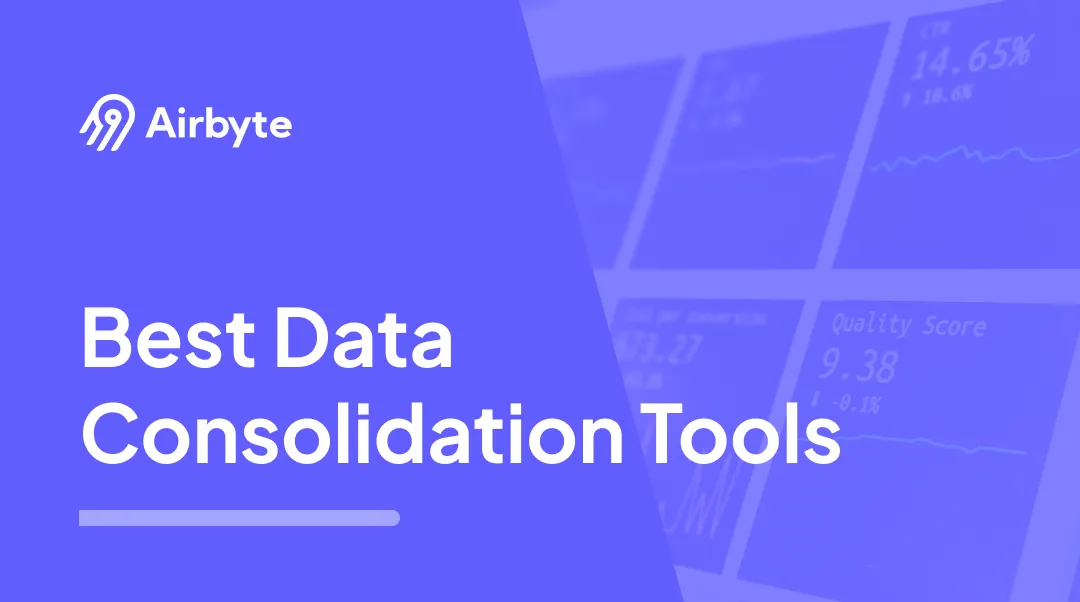
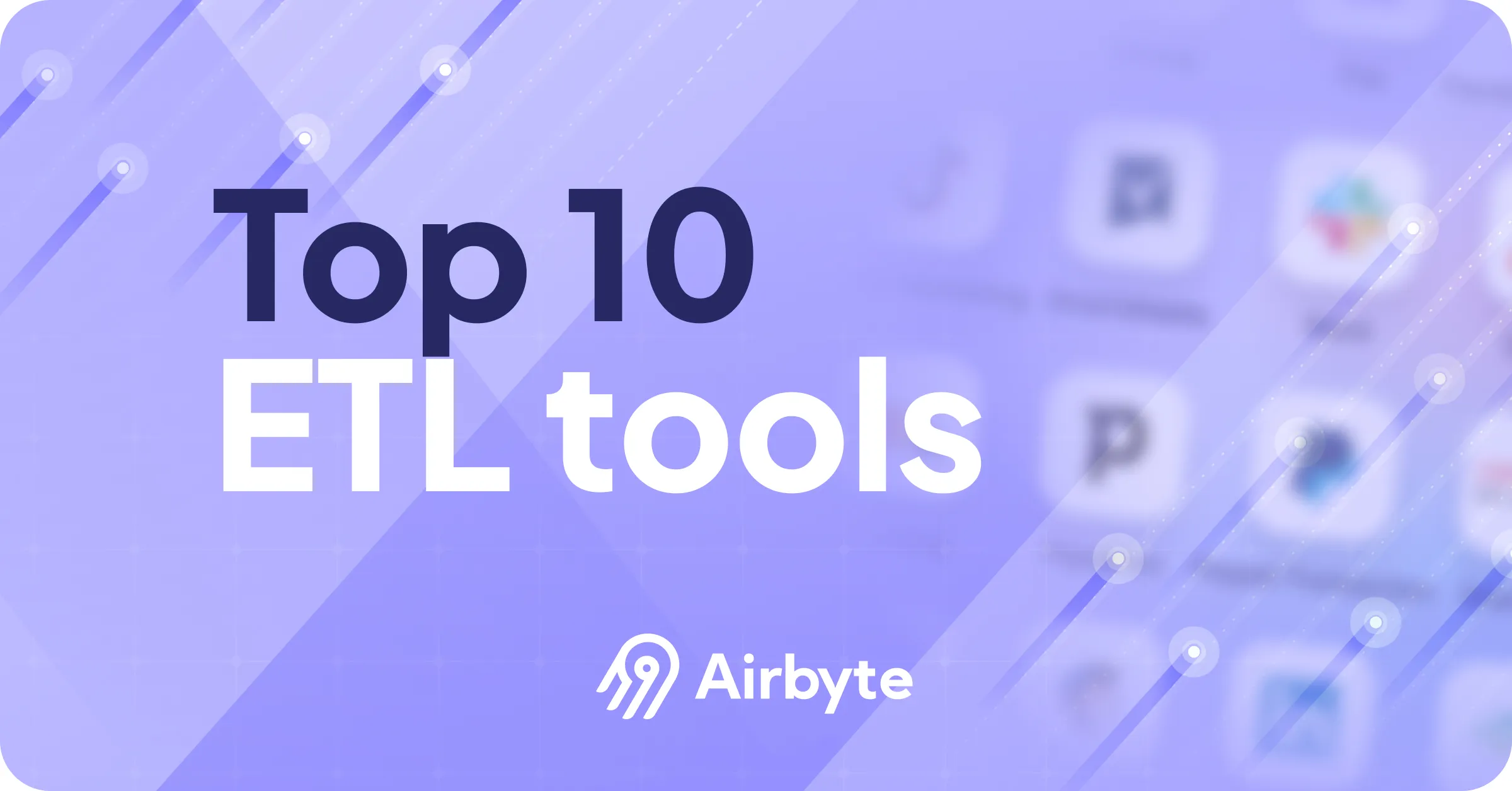
Data consolidation processes have emerged in response to the growing complexity of managing dispersed data. It involves merging data from various sources into a unified destination. You must utilize data consolidation tools to bring together large volumes of data swiftly and efficiently. Read ahead to gain an understanding of some of the best data consolidation tools.
What are Data Consolidation Tools?
Every business accumulates data from various systems. There are human resource databases, product catalogs, and CRM software holding information on thousands of prospective and existing customers. While each data holds intrinsic value within individual domains, the true potential of the datasets is unlocked when all of it is consolidated within your organization.
Data consolidation is a beneficial practice carried out by businesses that own diverse data sources across multiple locations. By using specialized tools, you can gather data, refine and collate it into a single repository like a cloud data warehouse. Having a centralized database location enables you to look beyond data fragments and streamlines the analysis process.
Key Benefits of Data Consolidation Tools
Data consolidation is sometimes interchangeably used with data integration. However, data consolidation can be understood as a step preceding integration. By bringing data from various places into a single warehouse, you gain a bird’s eye view of all the operations in your organization. A robust data consolidation tool also helps you utilize your data properly, leading to more meaningful decisions within the organization. Let’s understand some of the key benefits that a good data consolidation tool can provide:
- Better Analytics: Having a repository of consolidated data enables you to analyze large datasets comprehensively. This in-depth analysis leads to gaining accurate insights and making better decisions.
- Robust Planning: Consolidating and centralizing your data simplifies strategic business planning. It helps you determine data quality and capacity requirements as well as monitor security compliances.
- Enhanced Data Quality: Data consolidation allows you to transform diverse datasets into an acceptable and consistent format. This way, you can ensure data integrity throughout your organization.
- Save Time: By having critical data readily accessible in a centralized location, you save time on data retrieval and increase your operational efficiency. You can use business intelligence tools to create better visualizations and reports in no time.
Top 6 Data Consolidation Tools
Although you can manually set up a data pipeline to your desired cloud warehouse, it would require much time and effort. You will need to have an expert team who can create and maintain custom code pipelines in different programming languages. Hence, it is best to use a top data consolidation tool that makes the task quick and easy for you.
Airbyte
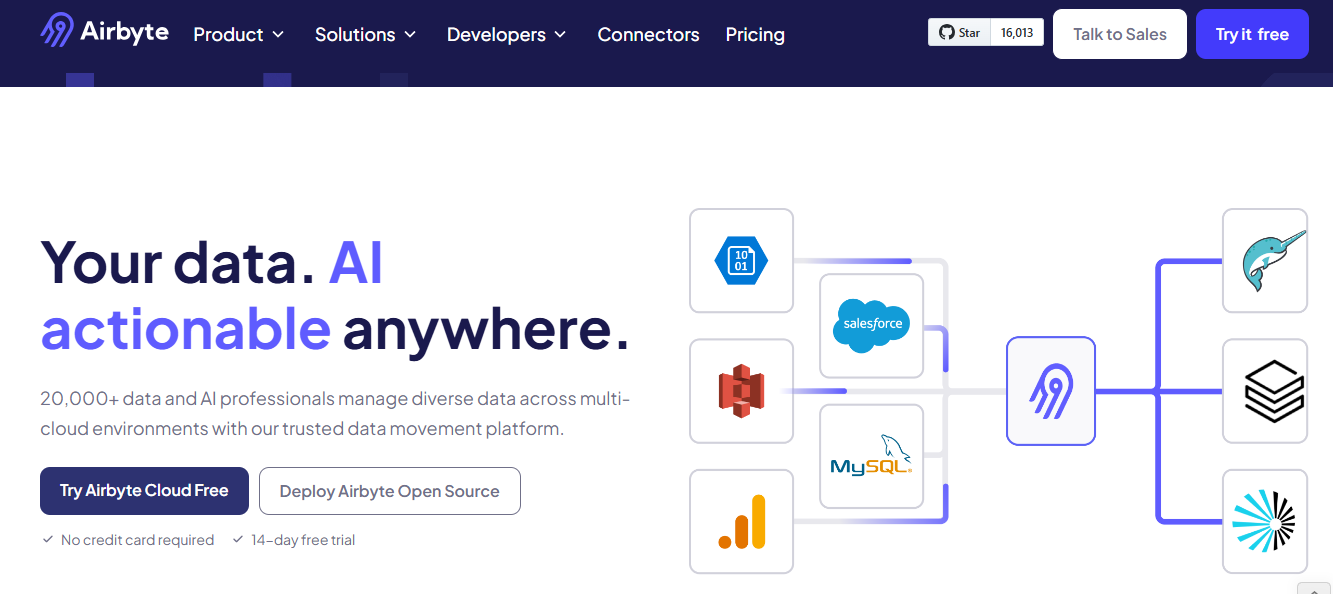
Airbyte is one of the leading data consolidation tools today. Using this platform, you can easily extract data from multiple sources. With two simple steps to configure the source and destination, your data pipeline is created within minutes on Airbyte.
One of Airbyte’s most popular features is its wide-ranging connector library. This data consolidation tool offers more than 550 built-in connectors, so you can connect to well-known CRM software or data warehouses to migrate your data. In case you do not happen to find a particular connector of your choice, you can create one in under 30 minutes. Through Airbyte’s Connector Development Kit (CDK), you can create a custom connector, and its maintenance will be done by the platform.
Airbyte offers you Change Data Capture (CDC) capabilities, wherein every new change occurring in the dataset source is registered and moved to the destination. It saves you from consolidating your datasets each time there are modifications made to it. After establishing a data pipeline, you do not have to update it, as Airbyte automates the sync based on the sync intervals that you have determined.
Key Features:
- Flexibility in Building Pipelines: Airbyte provides multiple development options for creating and managing data pipelines, catering to a wide range of users. These options consist of a user-friendly graphical interface (UI), an API, a Terraform Provider, and PyAirbyte. This flexibility lets you select the option that best suits your needs.
- Vector Store Integration: Airbyte facilitates integration with popular vector databases, such as Pinecone, Chroma, Milvus, and Qdrant. It enables you to perform automated chunking and indexing to transform your unstructured data and make it accessible to vector stores. This streamlines the development of LLM models and applications.
- Automatic Schema Detection: You can configure Airbyte to detect the schema changes occurring at the source and automatically propagate the changes to the destination. For Cloud users, source schema checks are scheduled every 15 minutes, and for Self-Managed users, every 24 hours. This helps you maintain data consistency between the source and the target systems.
- AI Assistant: Airbyte offers an AI Assistant to simplify the process of building connectors. You must provide a link to the API documentation, and the Assistant scans for details like base URL, authentication, and pagination. It then prefills and configures fields in the Connector Builder, significantly reducing setup time.
- Sync Resilience: Airbyte offers a Record Change History feature that enhances resilience against sync failures. When a record is identified as oversized or invalid, it automatically modifies problematic rows in transit, ensuring that the overall sync process remains uninterrupted. This approach prevents sync failures and maintains transparency by logging the changes made, enabling you to track modifications easily.
- Data Orchestration: Airbyte enables you to integrate with data orchestrators like Dagster, Prefect, or Apache Airflow to manage data pipelines. This helps you streamline the execution, scheduling, and monitoring of the pipelines.
Pricing: Airbyte provides a free, open-source version and several paid plans, including Airbyte Cloud, Airbyte Team, and Airbyte Self-Managed Enterprise. Each of these options features custom pricing tailored to its specific functionalities, enabling you to choose a plan that best fits your needs.
Rivery

Rivery is a SaaS data consolidation tool that provides you with the resources to create end-to-end ELT pipelines swiftly and efficiently. With over 200+ pre-built connectors, this platform ensures connectivity to a wide range of applications, databases, file storage options, and data warehouses.
Key Features:
- Custom connectors: Apart from the connectors library, Rivery offers you the option to build personalized connectors through their custom connectors API. You can extract data seamlessly from your desired API and load it into a data warehouse, eliminating the need for complex coding or manual data extraction.
- CDC: With the Change Data Capture feature offered by this data consolidation tool, you can track changes made to your database. It helps you ensure your data warehouse stays updated with the latest information in real time.
Pricing: Rivery offers three pricing plans based on the number of RPU credits you use. The Starter plan is priced at $0.75, the Professional plan starts at $1.20, and the Enterprise plan can be customized per your needs.
Fivetran
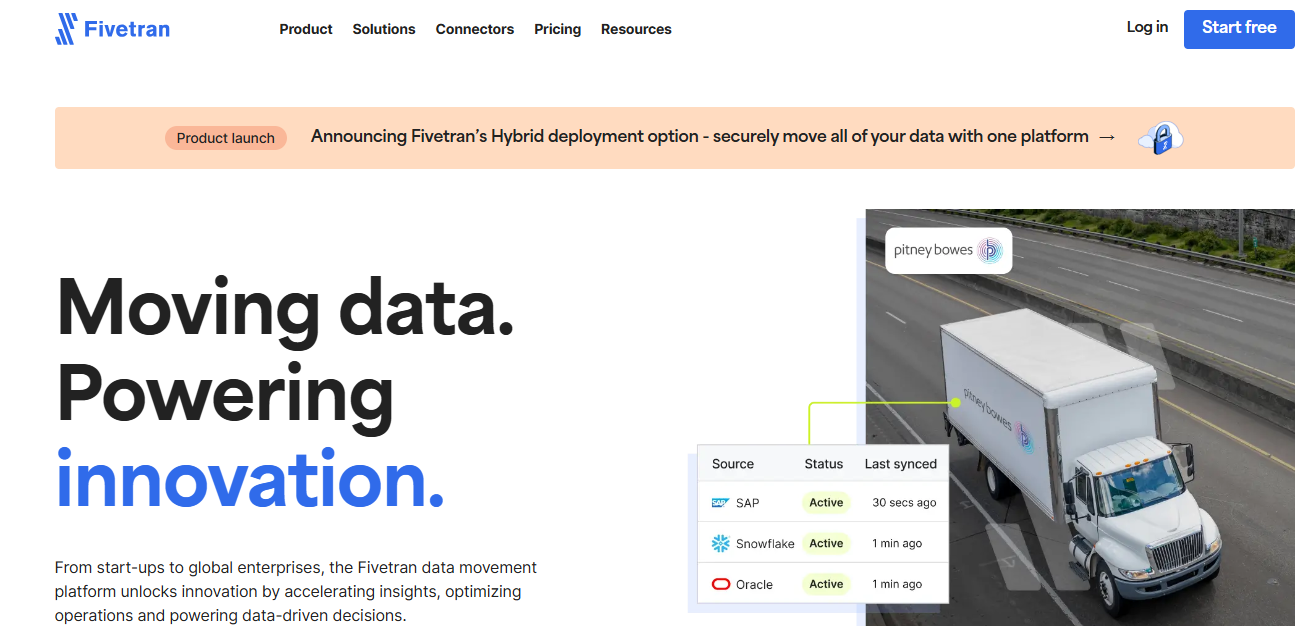
Fivetran is a data consolidation tool that facilitates real-time, low-impact data movement through its 400+ connectors. You can deploy Fivetran in the cloud for a fully-managed experience, on-premises to maintain data security requirements, or in a hybrid environment to combine both architectures.
Key Features:
- Automation: Fivetran has automated the time-consuming aspects of the ELT process, enabling you to move data through an efficient pipeline. Thus, you get more time to focus on transformation and analytics to improve your high-end projects.
- Quickstart Data Models: With this data consolidation tool, you can get access to Quickstart data models, which are pre-built dbt Core-compatible data models for some popular connectors. Using this feature, you can transform your data without additional dbt projects or third-party tools.
Pricing: Fivetran comes with a free starter plan, followed by three pricing plans: Starter, Standard, and Enterprise. You only have to pay for the monthly active rows (MAR) that you use.
Stitch
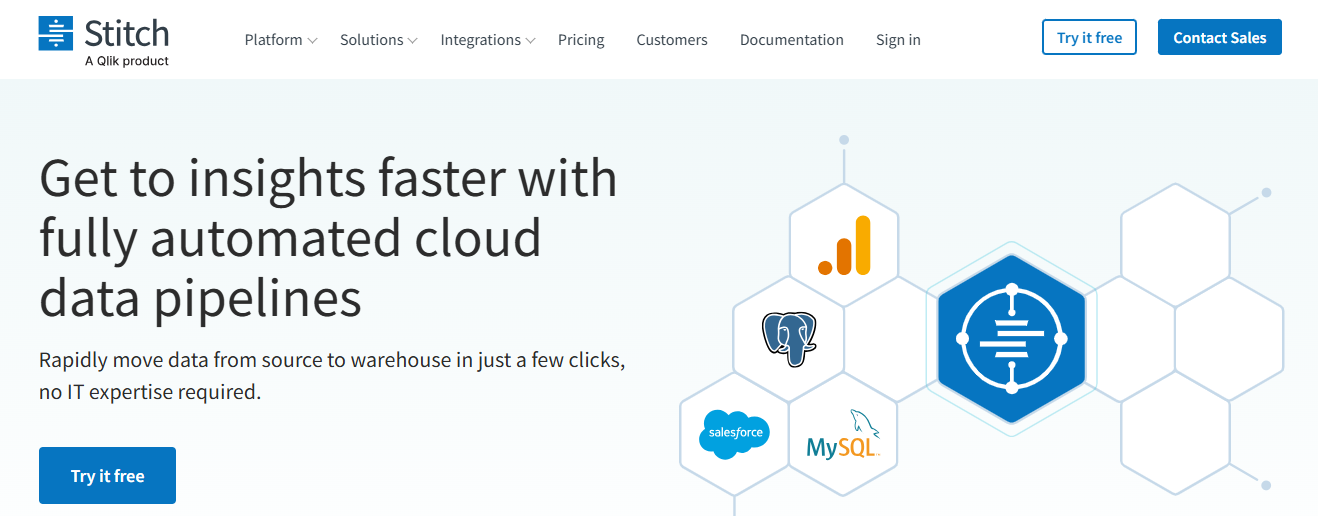
Stitch is an enterprise-grade cloud ELT platform that provides comprehensive data consolidation tools. You can create zero-maintenance cloud data pipelines within minutes by extracting and combining data from 140+ popular sources without writing a single line of code.
Key Features:
- Advanced Scheduling: You can leverage the Advanced Scheduler feature to define start times for extracting and consolidating data precisely. Stitch utilizes cron expressions that consist of six or seven subexpressions with detailed schedule specifics. It helps you pick and assign exact days of the week or month and time for your data pipeline.
- SLAs: If you are deploying Stitch for your enterprise, you can enjoy the advantages of service-level agreements (SLAs). This feature guarantees support response time, data freshness, and uptime.
Pricing: Stitch offers three monthly pricing plans: Standard, Advanced, and Premium, priced at $100, $1,250, and $2,500, respectively.
Hevo
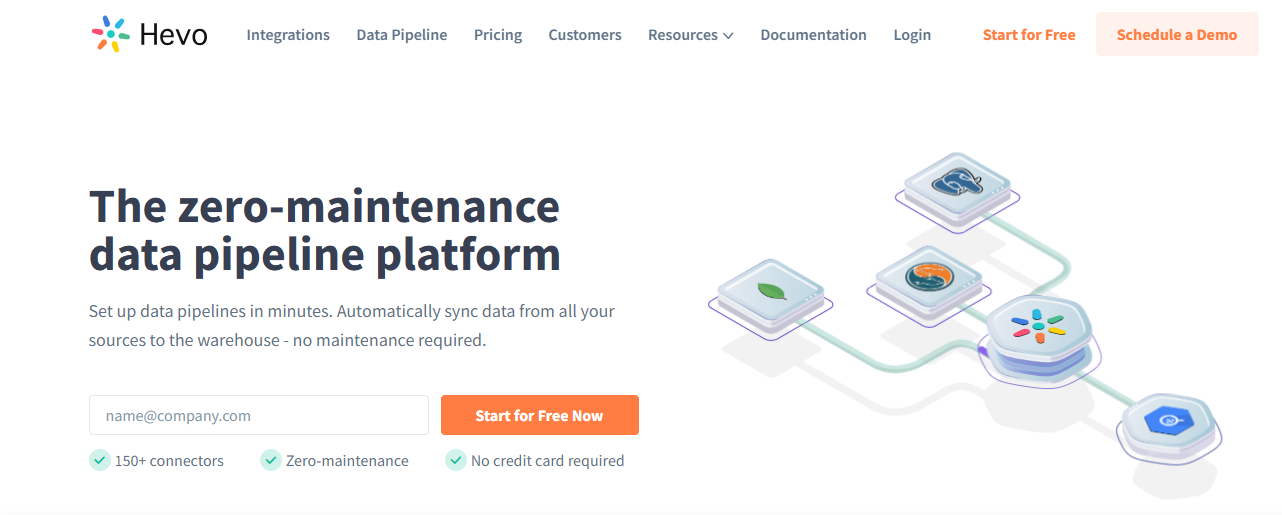
Hevo is a data consolidation tool designed to simplify the process of connecting diverse data sources to your desired destinations. This accessible platform provides 150+ pre-built connectors, allowing you to seamlessly create a data pipeline without writing code.
Key Features:
- Security: Hevo provides robust data security measures through end-to-end encryption and a range of secure connection options, such as SSH, Reverse SSH, and VPN. The platform also adheres to strict regulatory compliance standards, including HIPAA, SOC 2, and GDPR, guaranteeing data integrity and confidentiality.
- System Alerts: This data consolidation tool offers you visibility into system operations through personalized alerts. You get notifications on your email address for data pipeline incidents that require your attention, and you can manage the alerts through the Hevo Dashboard, too.
Pricing: Hevo offers you a free plan to get started. There are two pricing plans: Starter and Business. The first plan is priced at $239 per month, and the second one can be customized per your needs.
Integrate.io
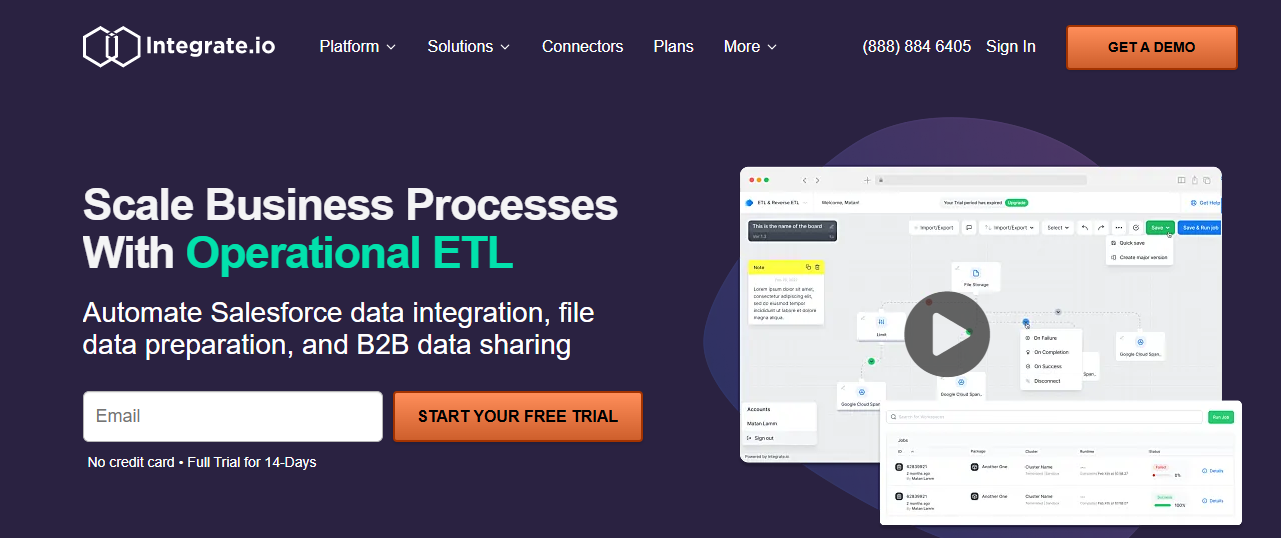
Integrate.io is one of the well-known data consolidation tools that provide you with 100+ connectors for the effortless creation of secure data pipelines. You can leverage the platform’s operational ETL processes to automate Salesforce data integration, file data preparation, and B2B data sharing.
Key Features:
- User-friendly Interface: Integrate.io has a low-code, user-friendly interface featuring intuitive drag-and-drop functionality. You can even conduct a few transformations on the platform, such as sort, join, filter, select, clone, and limit, to accelerate your data workflows.
- Reverse ETL: This data consolidation tool allows you to conduct reverse ETL processes. Here, you can seamlessly extract data from your data warehouse and power your CRM, ERP, and other SaaS software. This way, you can update your data source and destination with real-time data insights.
Pricing: Integrate.io offers you three pricing plans: Starter, Professional, and Enterprise. The first plan is priced at $15,000 per year, the second at $25,000 per year, and the last can be customized per your needs.
The Final Word
Data consolidation tools play a crucial role in helping you leverage your data effectively. You can enhance your operational efficiency and decision-making process, gaining a competitive advantage in the industry.
Choose a robust data consolidation tool like Airbyte to gather data from multiple sources without writing a single line of code. You can also learn more about the platform on Airbyte Wikipedia, which provides detailed insights into its features and background. Sign up for free to get started!
💡Suggested Read: Open Source ETL Tools
What should you do next?
Hope you enjoyed the reading. Here are the 3 ways we can help you in your data journey:



